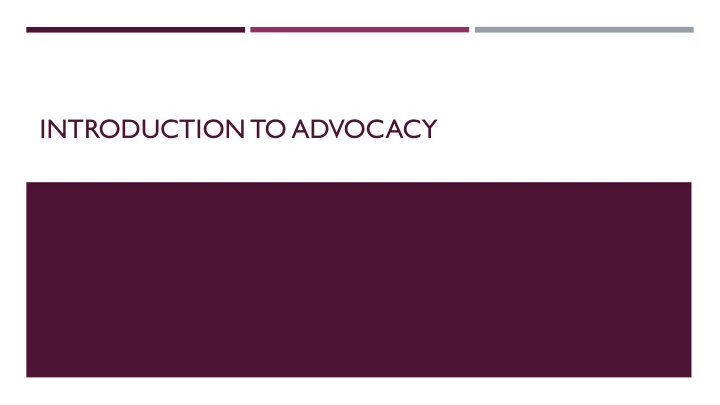

INTRODUCTION TO ADVOCACY
WHY ADVOCATE? Were it not for advocacy, the people we serve would still be in institutions like Willowbrook The squeaky wheel gets the oil It works, especially when large numbers advocate together
WHAT IS ADVOCACY? A relationship that benefits both sides An ongoing dialogue Your opportunity to explain to government officials what is needed and why it’s important A chance for individuals and families to speak for themselves An advocate is someone who speaks for another or defends a cause It is not an adversary It is a supporter It is assertive, not aggressive
WHO SHOULD ADVOCATE? Government relations professionals – good Direct support professionals – better People with disabilities and their families - best
TYPES OF ADVOCACY Voting Issue advocacy Budget advocacy Program visits Rallies/press events/Legislative Breakfasts Briefings Hearing testimony District office visits Chance encounters
THE BASICS Make sure you’re talking to the right part of government Make sure you’re talking to the right person Make sure you know what you’re asking for Talking points They can’t act unless you give them an action to do Be SPECIFIC – give a bill number, if you can Be prepared – know what tools work for you (lists, cards, etc.) Acquire knowledge – understanding the past helps us fight for the future Identify problems and propose solutions Build working relationsips – stand on common ground Communicate effectively, be an optimistic negotiator, and listen – strive for win/win
THE HIERARCHY OF CONTACTS Personal visit, face-to-face Handwritten letter Typed snail-mail Telephone call Email
THE ELEVATOR PITCH Be prepared to make your whole pitch during a single elevator ride Who are you? What is your mission? What do you want? How can they help you? Why should they help you?
THE ELEVATOR PITCH IN WRITING Leave them with a simple, easily digestible, clear, concise document that tells them everything in your elevator pitch Avoid jargon, acronyms, and unnecessary details One page is almost always enough
KEY THINGS TO AVOID Overwhelming them with too many issues Form letters Jargon Inconsistency Lying or exaggerating Negativity – being a sore loser Don’t try to impress them – keep it simple Don’t fight your cause at the expense of another Don’t expect to know everything Don’t have unrealistic requests Don’t forget to end on a positive note
KEY THINGS TO REMEMBER You’re the expert – don’t be shy They’re the government official – don’t be rude They’re called “public servants” for a reason – they work for you It’s NEVER a one -shot deal – follow up! Paraphrase and summarize Be aware of your body language – be open, not guarded Bring your personal story, but leave your “baggage” at home
MORE KEY THINGS TO REMEMBER Why are services essential? Show the bigger picture Help parents balance their passion with their emotions Best way to help someone is to ask Whenever possible, form a diverse group of constituents to provide a comprehensive picture Be prepared, but don’t over -rehearse Prepare a “leave behind” packet of information Try to make an appointment instead of dropping in (and be on time!) Stay on topic Answer legislator’s questions Try to ascertain their position – build bridges Get to know your elected officials and — mostly — get them to know you!
Recommend
More recommend